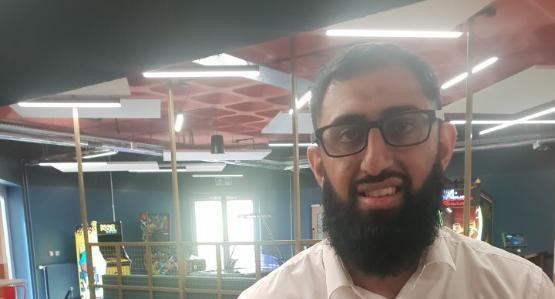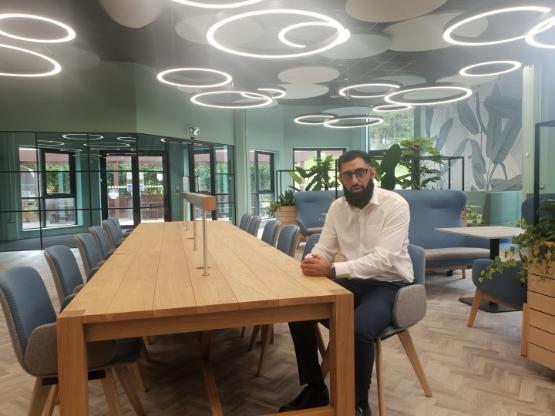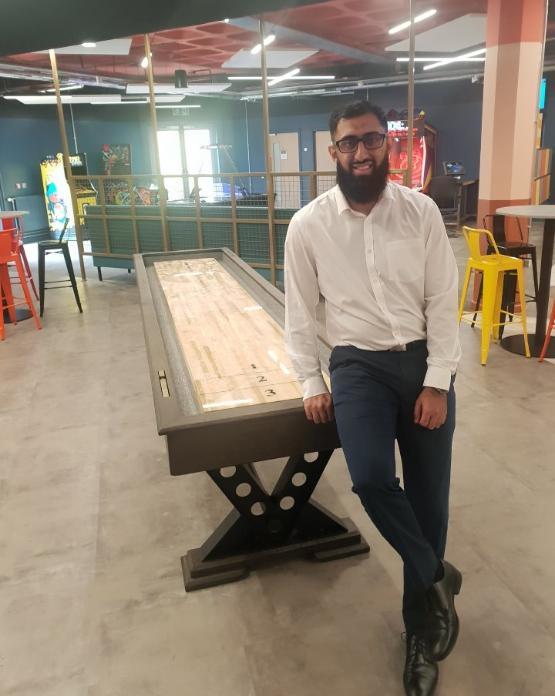UK’s youngest Student Union boss has vision for 24/7 campus
The UK’s youngest Student Union CEO wants to see students accessing services via voice-activated AI portals and a range of commercial outlets on a 24/7 campus.

Aleem Bashir recently turned 31, making him the youngest CEO of a students’ union in the country. The father-of-two, who graduated from the University of Bradford with a BSc in Economics in 2015, before embarking on a Business Analysis Graduate Scheme with FDM Group, has a bold vision for the future.
But, as the saying goes, he has his work cut out for him.
“We’re still issuing cheques to students,” he muses while sitting in his office in front of a huge kanban board. “That means we have to spend time showing students how to bank them. There are a lot of processes that are still done on paper and it’s time consuming.”
Aleem, who cut his teeth digitising back-office processes for the Department for Work and Pensions (DWP), believes now is the right time to pull the University of Bradford Students’ Union - known as UBU - into the 21st Century.
Student Central revamp
Six months into the job and he’s already riding a wave of optimism, thanks in part to a £2m revamp of Student Central, formerly a somewhat past-its-prime hang-out that incidentally boasted the ‘longest student bar in the UK’. The bar selling alcohol has been dramatically reduced (and yet still remains an impressive sight) to accommodate new areas selling mocktails and bubble-tea (to better reflect changing student trends), along with a game zone and a range of modern meeting and comfy relaxation spaces.

For Aleem, this is just the beginning of a long journey.
“The problem at the moment is, you pick one problem up and there are six more underneath, although that’s not necessarily a negative, because what we’re doing is finding things that have not been resolved and resolving them. Six months in, my vision is still there to modernise the SU and bring it into the 21st century, finding cost effective ways to maximise the manner in which we engage with students, while keeping quality at the top.
“For example, we have busy periods in our advice centre - in the past, the resolution has been to hire another advisor but is it cost effective to hire someone for 12 months when you only have five or six months of work for them?
“It is our aim to become financially more independent from the university. At the moment, we receive subvention [a grant] but we really need to start generating our own income. We will do this by selling merchandise, and enabling commercial outlets like barbers, hair and beauty salons to locate on campus.
“This will also improve the student offer. If you go to places like Cardiff, where the university is right in the city centre, they have all these shops and outlets and it’s a big draw for students.
"We need to start thinking about what that market looks like here on our campus, and we can then go from there and look at other things, such as the food offering and so on.”
But perhaps his biggest challenge will be to change the culture itself.
“You have to look at the value proposition,” he says. “If we get a particular bit of tech into the organisation, so we are not having to have multitudes of meetings, so we can simply update a log, that’s going to be huge.
“At the moment, we have a website with bits of information in different places, whereas what we want is a one-stop shop with a user interface that cuts out people getting different messages from different departments.

“This is about centralising processes, for things like academic support, financial advice, exam extensions, general student support. At the moment, it feels almost as though we’re stuck in the 1960s.
“In my background, we were encouraged to use AI for everything, if you are not using AI, you are falling behind. You wouldn’t tell someone to not use a calculator to find cosign and tangent, whereas before calculators, people used to use books for that, so we need to embrace technology, including AI.
“I would like to see voice-activated information points with built-in AI, so students can approach them and simply ask a question, like ‘how do I get to the Alhambra?’ or ‘Where’s my next lecture?’”
Aleem knows all about overcoming obstacles. One of his first actions as CEO was to ask everyone to share their Outlook calendars, to cut down on the time it takes to set up meetings.
Gerrard’s influence
He grew up in a four-bed house in Bradford that was home to 15 people, all members of his extended family, with roughly four people to a room. A former pupil of Nab Wood School (now Dixons Cottingley Academy), he cites former England and Liverpool footballer Steven Gerrard’s autobiography as one of his inspirations during his formative years.
“Steven Gerrard is probably not who you might think someone from a South Asian background would cite as an inspiration growing up but for me, he really was. I read his autobiography and in it, he recounts this story about how a foot injury when he was about nine almost ended his career before it began. He went on to become one of Liverpool’s most influential players. So, that’s about overcoming adversity and that’s something I really identified with.
“In terms of how that translates to now, I think it’s about teamwork and making sure the senior team is able to identify and remove roadblocks to enable people to meet their goals.”
Following his stint at DWP, Aleem went to work for software management providers Prometheus Group, whose clients include Shell, NASA, Bridgestone and Disney. His job was to show clients how to use software that took processes and automated them while ensuring the smooth running of the company.
“If you have something like an oil refinery and it needs to close for one week every year in order for deep cleans, inspections and refurbishments and so on, then that shut-down week is potentially costing the company tens of millions of pounds, so everything has to run like clockwork, otherwise, it’s costing a lot of money.
“What I would like to see for the university and UBU is for them to be much more open in terms of how they operate, for services to be more accessible and for those services to be available outside the usual 9-5.
“This is not just something we can think about doing, it’s something we must do if we’re going to remain competitive. I can see where we need to be, I can see the challenges we need to overcome and I can see how we can overcome them, so it’s just a case of persevering with that plan to transform the student experience.”
Aleem says he enjoyed his time studying Economics at the University of Bradford, and it’s not too late to apply to start an Economics programme this autumn, applications for Economics are open at Bradford until Wednesday 2 October through Clearing.
He said: "Studying Economics at the University of Bradford, I learned about numerous practical subjects that have benefitted me immensely.
“I studied micro-economics and consumer behaviours and how this effects day-to-day expenditure. This raised my awareness around finances and financial planning giving me the ability to plan ahead and predict what may or may not happen in the future to ensure I make the most informed choices.”
Clearing is an opportunity for prospective students to find a place in higher education attracting a wide range of people, from students who may already have results from the previous year to those who have changed their mind about a course or who have not received the grades they expected and those who have not yet applied to start a University course this autumn.
Apply through Clearing online or call 0808 196 9129.
